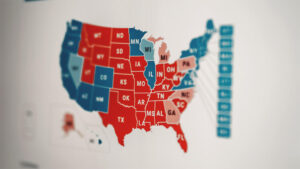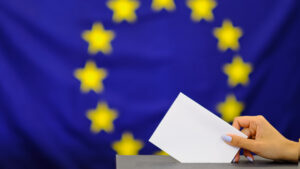After the first round of European Parliament elections, the French far-right (represented by the National Rally) had a great showing. President Macron wasn’t too happy with that outcome, so he called snap elections to give his party a second shot at capturing a majority.
There are a few reasons that Macron knew this might yield more favorable results. There is a known shift in voting patterns between first and second round votes, where voters start more emotional and end more practical. There are lots of voting tactics Macron’s party could use to garner some more votes, like removing multiple candidates to prop up a single one. The most important one here was the timing; the other parties didn’t have enough time to pull together strong candidates, so Macron’s party could use that to their advantage. And Macron was right…mostly.
The National Rally took third in the snap elections, Macron’s party took second, and the Left came in first. The French aren’t out of the woods quite yet though. Since none of the factions had a majority to form a government, we’re going to see some French cooperation, and you can expect how that will go.
The threat of political instability within France could prove to be a big problem for the rest of Europe too. Without France (attempting to be) at the helm, and no other countries fit to step into that role, Europe will need to figure something out ASAP.
Here at Zeihan On Geopolitics we select a single charity to sponsor. We have two criteria:
First, we look across the world and use our skill sets to identify where the needs are most acute. Second, we look for an institution with preexisting networks for both materials gathering and aid distribution. That way we know every cent of our donation is not simply going directly to where help is needed most, but our donations serve as a force multiplier for a system already in existence. Then we give what we can.
Today, our chosen charity is a group called Medshare, which provides emergency medical services to communities in need, with a very heavy emphasis on locations facing acute crises. Medshare operates right in the thick of it. Until future notice, every cent we earn from every book we sell in every format through every retailer is going to Medshare’s Ukraine fund.
And then there’s you.
Our newsletters and videologues are not only free, they will always be free. We also will never share your contact information with anyone. All we ask is that if you find one of our releases in any way useful, that you make a donation to Medshare. Over one third of Ukraine’s pre-war population has either been forced from their homes, kidnapped and shipped to Russia, or is trying to survive in occupied lands. This is our way to help who we can. Please, join us.
Transcript
Hey everybody, Peter Zeihan here, coming to you from the Lake of the Ozarks in southern Missouri. We’re going to finish up our election series today by talking about one of the most convoluted of the big elections that just happened last week, and that is France.
The backdrop is that a few weeks ago, we had European Parliament elections. The French hard-right, represented by a group that calls themselves the National Rally, did very, very, very, very well. The president of France, Emmanuel Macron, who’s of a more centrist alliance, saw this as a threat and decided to try his hand at snap elections to force the French people to support a more pragmatic government, i.e., his. In a way, it worked out in two rounds of voting. At first, the National Rally did very, very, very, very well. Then they did very, very, very, very badly. Ultimately, they came in third behind a couple of other alliance groups, one on the left, one in the center, supporting Macron.
There are a couple of reasons for this. The first reason is that there’s a typical pattern in French voting where, in your first vote in the first round, you vote your heart, and in the second vote, you vote your head. So, the idea is you might vote for what you’re passionate about the first time around, but you’re much more practical the second time around. That was definitely in play. A second reason is that there’s a lot of tactical voting where you could have five, six, seven, or eight candidates contesting the same seat in the first round. In the second round, basically everyone who was third, fourth, fifth, sixth, or seventh dropped out in order to concentrate the oppositional votes to make sure that the National Rally would not get the seat. That meant that the National Rally went from being the faraway favorite to coming in a relatively distant third.
But the third, and far more important reason why the National Rally busted, was simply time. From the point Macron called the elections to the point that we had the first round, it was only two weeks, and then only another week before we had the second round, so they really didn’t have a lot of time to prepare. There are 577 parliament districts in France, and going into these elections, the National Rally really wasn’t a true national party in that they had representation and supporters in every single district. So when they had to come up with 577 candidates, one for each district, one who lived in each district, a lot of times they went with just some activists.
And if you guys are politically wired, you know that there are activists in your party who are wackadoo. There were some wild racists and some wildly incompetent people who found themselves on the ticket for the National Rally, which meant not just that they didn’t have a chance, but the candidates on the left and the center were able to parade these people nationwide and show what fools the National Rally were. At least that was their view. Take this together, especially that last piece, and it worked.
But we’re not out of the woods yet. Remember, there are three big factions here. You had the hard right, the National Rally, you had the centrists around Macron, and then you had this left alliance that is actually four different parties made up of radicals, communists, socialists, and Greens. They had the same problem that the National Rally had; they only had a couple of weeks to build this electoral alliance to contest the elections. While they came in first, they have nowhere near enough seats in parliament to run a government. Nobody does. In fact, if you were to take any of these three factions and throw all the minor parties in with them, there’s still not enough.
So to have a majority government, two of these three factions have to be able to work together. Well, no one wants to work with the National Rally, so that eliminates them. For the new leftist alliance, the single largest chunk is the party of a guy named Jean-Luc Mélenchon. The best way to describe this is he has the personal charm of Marjorie Taylor Greene in the United States, the intelligence of Cori Bush, makes up math like Elizabeth Warren, and has the personality of a cold, hairy pile of vomit. He’s a hateful person, he’s a snake, and no one wants to work with him. But his party in that four-group coalition that is the left alliance is the single largest.
We already have party leaders throughout the leftist alliance saying that Mélenchon is a problem and he will never be prime minister, but he now represents the single largest chunk of seats in parliament as part of that alliance. So we’re entering into something that is very unexpected and unfamiliar for France: political instability. The single largest party in the overall parliament, the National Rally, no one wants to work with. The ruling party that works with Macron has been a little bit discredited. The left is an absolute mess, with its titular leader being a complete moron. There is no clear path forward here.
This isn’t Israel, this isn’t Italy; no one here has experience building coalition governments. According to the French constitution, you can’t have another election to fix this at the ballot box within a year. So you take France, which until now has been the Eurozone country with the single strongest political leadership, and you basically remove it from play until such time as the French can find a way to make this work. I doubt that’s going to happen in this calendar year or next calendar year. This is a really bad time for Europe to not have leadership.
If you look around Europe and see what’s left, the French are out to lunch dealing with their own internal stuff. The Germans have a three-party coalition that is already incredibly weak, led by an even weaker chancellor. The next country down is Italy, which is led by someone on the right, Giorgia Meloni. That means if you’re the United States and Russia at this time, all of a sudden Europe has become a little bit of a piece of taffy to be pulled.
At the moment, because of the Ukraine war, that means the ball is very clearly in the United States’ court. But never forget, this is an election year in the United States too. Whether it’s Biden or Trump, it’s going to be difficult for Washington to focus the kind of attention on Europe that it honestly deserves right now.
So we basically took the last big pillar of European—not solidarity, not leadership, not democracy, but coordination—and we’ve knocked it down. This is going to be a big problem, as you’ll see in the next video, because this is only the beginning of what needs to be done within Europe.








